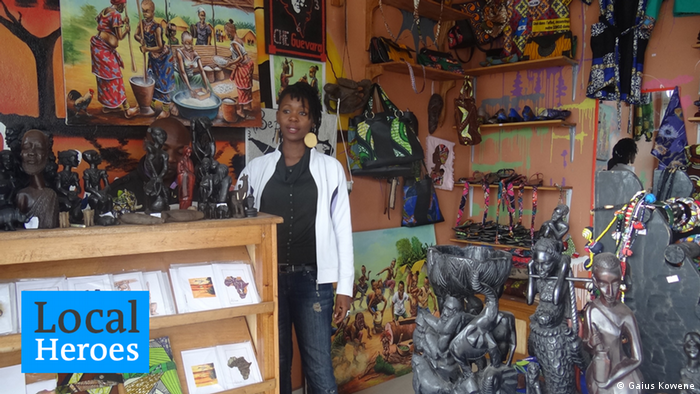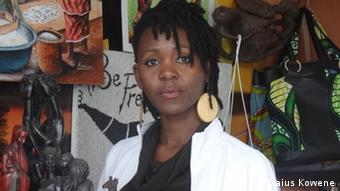Helping artists in the middle of conflict
Mapendo Sumuni, a young art lover, is helping artists in the eastern
Democratic Republic of Congo gain visibility and sell their works. She
dreams of selling local art to an international market one day.
Mapendo Sumuni has had a love for art since her childhood. Just a month
ago, she opened her art gallery in Goma, the capital of North Kivu
province in the Democratic Republic of Congo (DRC). The shop is full of
wooden carvings, paintings, jewelry, shoes and even bags made from local
fabrics.
As a teenager, Mapendo Sumuni had already organized events to help artists gain visibility and sell their work. Now at the age of 30, even her full-time job with an international NGO does not prevent her from pursuing her passion for art. That passion is what drove her to establish Kivu Nuru, which means "lights from Kivu."
"There are a lot of artists who are doing what they don't like because they don't find a way how they can live," Mapendo Sumuni says. "You can find an artist who is a security guard and who draws so well, but he doesn't know how he can sell it." The more an artist sells, the more time he has to create beautiful works every day, she adds.
Pursuing a dream
In the pursuit of her vision, Mapendo Sumuni meets artists from different fields every week to assess their creative works. Some of the artists Mapendo Sumuni is helping have formed a committee to select the best works for their clients.
But their work has always been challenging. For two decades now, the Congolese army has been conducting operations against armed groups responsible for serious human rights violations in the region. Fighting in the eastern DRC has seen scores of people killed, thousands of families displaced, children coerced into taking up arms, and thousands of women raped.
Pressing on despite challenges
When asked if she is not worried that instability in the region may destroy all of her efforts, Mapendo Sumuni becomes somewhat uneasy. "We cannot take this as a reason to not continue to live, to produce or to create," she says. "If we are not doing it now, when are we going to do it - in 10 years or 20 years?"
Two customers, who have been browsing around for gifts, like what they see. "It's very nice!" one of them comments. "Especially, I like these very Congolese puppets, and I think [the shop] presents a very good picture of what Goma is to the world."
The other customer joins in and encourages the owner to keep up the good work. "To the owner I say: keep going, keep continuing with this - and to the world: come to Goma and experience the creative side of Goma."
It is praise like this from artists, clients and friends that pushes Mapendo to continue to strive for more. She wants to help change the world's perception of the eastern DRC and sell to a global market.
"The future I'm seeing is like we are going to produce more," she says. She expects a lot more creativity. "People in the world will see us as a new generation of artists who want to go further - not as rapists." So why not bring things up to an international level, she asks.
Currently, Mapendo and her art gallery, Kivu Nuru, are building a network with other artists of the Great Lakes region.
As a teenager, Mapendo Sumuni had already organized events to help artists gain visibility and sell their work. Now at the age of 30, even her full-time job with an international NGO does not prevent her from pursuing her passion for art. That passion is what drove her to establish Kivu Nuru, which means "lights from Kivu."
"There are a lot of artists who are doing what they don't like because they don't find a way how they can live," Mapendo Sumuni says. "You can find an artist who is a security guard and who draws so well, but he doesn't know how he can sell it." The more an artist sells, the more time he has to create beautiful works every day, she adds.
Pursuing a dream
In the pursuit of her vision, Mapendo Sumuni meets artists from different fields every week to assess their creative works. Some of the artists Mapendo Sumuni is helping have formed a committee to select the best works for their clients.
But their work has always been challenging. For two decades now, the Congolese army has been conducting operations against armed groups responsible for serious human rights violations in the region. Fighting in the eastern DRC has seen scores of people killed, thousands of families displaced, children coerced into taking up arms, and thousands of women raped.
Pressing on despite challenges
When asked if she is not worried that instability in the region may destroy all of her efforts, Mapendo Sumuni becomes somewhat uneasy. "We cannot take this as a reason to not continue to live, to produce or to create," she says. "If we are not doing it now, when are we going to do it - in 10 years or 20 years?"
Two customers, who have been browsing around for gifts, like what they see. "It's very nice!" one of them comments. "Especially, I like these very Congolese puppets, and I think [the shop] presents a very good picture of what Goma is to the world."
The other customer joins in and encourages the owner to keep up the good work. "To the owner I say: keep going, keep continuing with this - and to the world: come to Goma and experience the creative side of Goma."
It is praise like this from artists, clients and friends that pushes Mapendo to continue to strive for more. She wants to help change the world's perception of the eastern DRC and sell to a global market.
"The future I'm seeing is like we are going to produce more," she says. She expects a lot more creativity. "People in the world will see us as a new generation of artists who want to go further - not as rapists." So why not bring things up to an international level, she asks.
Currently, Mapendo and her art gallery, Kivu Nuru, are building a network with other artists of the Great Lakes region.


No comments:
Post a Comment